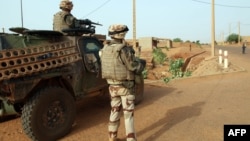UNITED NATIONS —
The head of the U.N. mission in Mali said recent security incidents are an “important wake-up call” and urged the Security Council to enable the rapid deployment of additional troops and helicopters to the mission.
Bert Koenders welcomed progress in Mali, including recent presidential elections and moves toward national reconciliation talks, but said serious threats to peace and security remain, including recent attacks by al-Qaida in the Islamic Maghreb (AQIM) and the militant group MUJAO.
“In addition to the security threat from the armed groups and terrorists which mainly affected the northern regions, the authorities had to contend with tensions within the armed forces,” said Koenders.
He said an incident earlier this month involving about 30 disgruntled soldiers who kidnapped two officers was peacefully resolved, but is a reminder of the urgent need for reestablishing discipline and the chain-of-command in the army.
The U.N. stabilization mission in Mali began on July 1, taking over and absorbing troops from an African-led force.
A recent report by the U.N. Secretary-General said mission, known as MINUSMA, has just over 5,200 troops. That is less than half of the 12,600 troops authorized by the Security Council.
The report also says at least two more infantry battalions and a special forces company are needed, as well as military helicopters. Without these assets, the Secretary-General said, he expects it will take longer for the force to reach full operational capability.
Mission chief Koenders echoed this request in his remarks to the council. “I call on the members of this council, and troop and police contributing countries, to do their utmost to enable the rapid deployment of additional enablers and battalions to Mali in order for MINUSMA to effectively and timely discharge its mandate,” he said.
Mali’s minister of national reconciliation and development of the northern regions, Cheick Oumar Diarrah, told the Council that Mali is now on the path toward building rule of law and fighting corruption and impunity. But he warned that terrorists, armed groups, jihadists and organized criminal gangs are a threat to the fragile peace and stability in the north and to the entire Sahel region.
Both the Malian minister and Koenders drew attention to the worrying humanitarian situation. There are still hundreds of thousands of refugees and displaced persons who fled their homes in the north where armed groups seized control for several months last year.
The United Nations warns 3.5 million people are food insecure in the country and a humanitarian appeal is less than half-funded, with a $300 million shortfall.
Bert Koenders welcomed progress in Mali, including recent presidential elections and moves toward national reconciliation talks, but said serious threats to peace and security remain, including recent attacks by al-Qaida in the Islamic Maghreb (AQIM) and the militant group MUJAO.
“In addition to the security threat from the armed groups and terrorists which mainly affected the northern regions, the authorities had to contend with tensions within the armed forces,” said Koenders.
He said an incident earlier this month involving about 30 disgruntled soldiers who kidnapped two officers was peacefully resolved, but is a reminder of the urgent need for reestablishing discipline and the chain-of-command in the army.
The U.N. stabilization mission in Mali began on July 1, taking over and absorbing troops from an African-led force.
A recent report by the U.N. Secretary-General said mission, known as MINUSMA, has just over 5,200 troops. That is less than half of the 12,600 troops authorized by the Security Council.
The report also says at least two more infantry battalions and a special forces company are needed, as well as military helicopters. Without these assets, the Secretary-General said, he expects it will take longer for the force to reach full operational capability.
Mission chief Koenders echoed this request in his remarks to the council. “I call on the members of this council, and troop and police contributing countries, to do their utmost to enable the rapid deployment of additional enablers and battalions to Mali in order for MINUSMA to effectively and timely discharge its mandate,” he said.
Mali’s minister of national reconciliation and development of the northern regions, Cheick Oumar Diarrah, told the Council that Mali is now on the path toward building rule of law and fighting corruption and impunity. But he warned that terrorists, armed groups, jihadists and organized criminal gangs are a threat to the fragile peace and stability in the north and to the entire Sahel region.
Both the Malian minister and Koenders drew attention to the worrying humanitarian situation. There are still hundreds of thousands of refugees and displaced persons who fled their homes in the north where armed groups seized control for several months last year.
The United Nations warns 3.5 million people are food insecure in the country and a humanitarian appeal is less than half-funded, with a $300 million shortfall.




